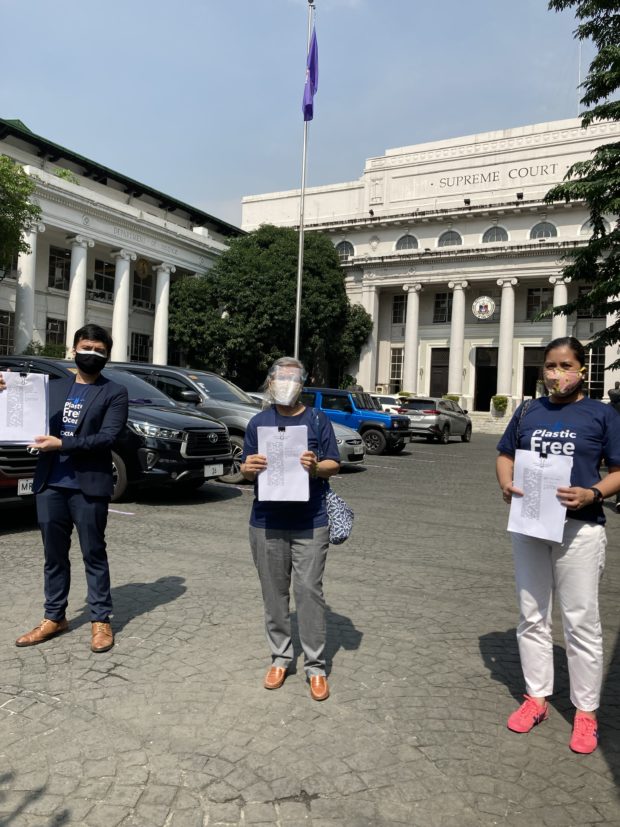
Representatives from various groups – (left to right) Atty. Michael De Castro – Counsel and petitioner; Atty. Gloria Estenzo Ramos – Oceana Vice President and petitioner; Mae Chatto – Oceana Campaigns Specialist and petitioner – call for writ of kalikasan. PHOTO from Oceana
MANILA, Philippines—A petition has been filed before the Supreme Court to call on the government to finally clamp down on the unrelenting emission of millions of tons of plastic waste into every nook and cranny of the country including Manila Bay.
Petitioners from various environmental organizations, fisherfolk, local lawmakers and former senator Sergio Osmeña III urged the high court to step in by issuing a writ of kalikasan and a writ of continuing mandamus for the government’s 20-year inaction on non-environmentally acceptable products and packaging (NEAPP.)
A Writ of Kalikasan is a legal remedy that protects a person’s right to “a balanced and healthful ecology in accord with the rhythm and harmony of nature,” under Section 16, Article II of the Constitution.
Their 101-page petition also called on the high court to issue a Temporary Environmental Protection Order (TEPO) pending litigation.
“The continued disregard of the Respondents’ mandate under R.A. No. 9003 [Ecological Solid Waste Management Act of 2000] will continue to aggravate the widespread environmental damage already caused by the proliferation of plastic to the natural life support system that we all depend on for survival. Worse, the lives and health of every Filipino now existing and yet unborn is continuously prejudiced by the Respondents’ refusal to implement their mandate,” petitioners said.
Petitioners complained that the government has spanned three administrations and has not implemented policies or mandates under the Constitution and Republic Act 9003.
Petitioners also cited violations of international treaties, including the Paris Agreement, Stockholm Convention and the London Protocol.
As proof, the petitioner mentioned a study published in Science Advances in April this year, where the Philippines has been singled out as the largest contributor to plastic emissions in the world, emitting 356,371 metric tons of mismanaged plastic waste per year, which passes through 4,280 of its rivers and into the ocean.
“For twenty long years, the Respondents steadfastly refused to prepare the list of non-environmentally acceptable products under Section 29 of R.A. No. 9003. In doing so, they allowed plastic pollution to proliferate,” petitioners said.
Section 29 of RA 9003 provides that the National Solid Waste Management Commission (NSWMC), an inter-agency body under the Office of the President, shall release the list of non-environmentally acceptable products (NEAP) for prohibition a year after the law took effect in 2001.
Petitioners said the government has already received two prior notices to sue, but “despite such notices, Section 29 remains unimplemented.”
“By refusing to issue any list, the Respondents defeated the policy of R.A. No. 9003 towards ‘solid waste avoidance and volume reduction through source reduction and waste minimization measures.’ The respondents flouted their mandate not just once but continuously over the course of 20 years,” petitioners said.
Petitioners said the government’s inaction resulted in the disposal of plastic waste at the approximate rate of 164 million sachets, 48 million shopping bags, and 45.2 million plastic also discarded daily, for a total of about 2.7 to 4 million tons of mismanaged plastic waste per year.
To date, petitioners said BPA had been detected in Philippine rivers and bays. BPA or Bisphenol A, the monomer of polycarbonate, has been known for its endocrine disrupting effects for some time. Citing studies, petitioners told the high court that BPA exposure had been shown to lower semen quality and infertility, interfere with thyroid function and neuropsychiatric development, among others.
“Filipino chemists have detected significant concentrations of BPA in several rivers surrounding Manila bay, Batangas bay, and Subic Bay,” they said.
Not only the livelihood but the health of every citizen are affected, petitioners said.
“Every second that the Respondents continue to allow the defilement of our natural resources and the very environment we all depend on for life, only the manufacturers, distributors, and sellers of cheap plastic products stand to profit ─ at the expense of the health, lives, and future of everyone else,” petitioners said.